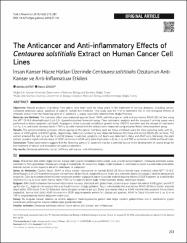The Anticancer and Anti-inflammatory Effects of Centaurea solstitialis Extract on Human Cancer Cell Lines
Abstract
Objectives: Natural products originating from plants have been used for many years in the treatment of various diseases, including cancer. Centaurea solstitialis subsp. solstitialis is used in Turkish folk medicine. This study was the first to determine the in vitro biological effects of ethanolic extract from the flowering parts of C. solstitialis L. subsp. solstitialis collected from Mugla Province. Materials and Methods: The cytotoxic effect was evaluated against Daudi, A549, and HeLa cancer cells and one normal BEAS-2B cell line using the MTT (3-(4,5-dimethylthiazol-2-yl)-2,5- dipenyltetrazolium bromide) assay. Flow cytometric analysis and the caspase-3 activity assay were performed to detect apoptotic cell death. Angiogenic factor [vascular endothelial growth factor (VEGF)] secretion and the release of interleukin (IL)-1 alpha, IL-6, and tumor necrosis factor (TNF)-alpha by cells treated with the extract were measured using enzyme-linked immunosorbent assay. Results: The extract exhibited cytotoxic effects against all the cancer cell lines used but HeLa and Daudi were the most sensitive cells, with IC50 values of 63.18 pg/mL and 69.27 mu g/mL, respectively. Selective cytotoxicity was observed between the HeLa and normal BEAS-2B cell lines. The extract arrested the cell cycle at the S and G2 phases. In addition, apoptotic cell death was detected in HeLa and A549 cells. Moreover, the plant extract caused a significant decrease in VEGF secretion in A549 cells and a fluctuation in IL-1 alpha, IL-6, and TNF-alpha secretion in A549 and Daudi cells. Conclusion: These observations suggest that the flowering parts of C. solstitialis may be a potential source in the development of natural drugs for the treatment of cancer and modulation of cytokine secretion.
Source
Turkish Journal of Pharmaceutical SciencesVolume
16Issue
3URI
https://doi.org/10.4274/tjps.galenos.2018.27146https://app.trdizin.gov.tr//makale/TXpVME1qQTNOdz09
https://hdl.handle.net/20.500.12809/913


















